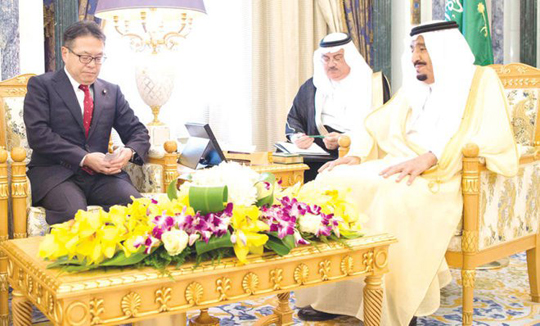Riyadh, Oct 10: Sunday’s meetings between the visiting Japanese ministers and Saudi officials in Riyadh have given a fresh boost to their bilateral relations.

Custodian of the Two Holy Mosques King Salman received at Al-Yamamah Palace Japanese Minister of Economy, Trade and Industry, Hiroshige Seko and Minister of State for Foreign Affairs Kentaro Sonora and their accompanying delegation.
During the meeting, the relations between the Kingdom of Saudi Arabia and Japan as well as the prospects for bilateral cooperation between the two countries in various fields were reviewed. The audience was attended by a number of Saudi ministers and the ambassador of Japan to the Kingdom, Norihiro Okuda.
Deputy Crown Prince Mohammed bin Salman, second deputy premier and minister of defense, also reviewed with the visiting ministers the areas of partnership to realize Saudi Arabia’s Vision 2030.
The two parties discussed the role of Japanese companies and government in activating the achievement of the Vision, including the development of joint programs between the two countries since the start of the Joint Saudi-Japanese Group for Vision 2030. The meeting was attended by Minister of Economy and Planning Adel Fakeih.
At the meetings between the ministers, Japan and Saudi Arabia agreed to advance bilateral cooperation in fields such as network-connected devices and renewable energy.
In the first meeting held in the Saudi capital to support the Kingdom’s structural reform drive and help Japanese companies to make inroads, Trade Minister Hiroshige Seko said the occasion marks the beginning of bilateral cooperation in a concrete form.
"If combined with the Abenomics economy policy mix being pursued by the government of Prime Minister Shinzo Abe, Saudi Arabia’s reform efforts would create a “synergy” that yields great benefits,” Seko said at the outset of the meeting.
The ministerial-level meeting was attended by Adel Fakeih, minister of economy and planning, among other officials.
At the meeting, the two sides also agreed on Japanese support in such areas as talent development in animation and video games, energy conservation and nuclear power, martial arts seminars and athletic training, Japanese officials said.
Executives of about 30 Japanese companies accompanying Seko also met with Saudi officials and pitched their business plans.
The meeting was the result of an agreement reached between Abe and Deputy Crown Prince Mohammed bin Salman in Tokyo last month.
During the meeting between businessmen of the two countries held at the headquarters of the Council of Saudi Chambers on Sunday, Japan and Saudi Arabia agreed to advance bilateral trade cooperation between the two private sectors.
Speaking on behalf of the Saudi team at the headquarters of the Council of Saudi Chambers, Tariq Al-Qahtani told the Japanese officials that there is the second largest trade partner to the Kingdom enjoying a bilateral trade of $57 billion in 2013. He said the recent visit of the deputy crown prince to Japan and an earlier visit of King Salman when he was crown prince, had boosted trade between the two countries.
Al-Qahtani recalled that during these visits, a number agreements were signed and they are now being successfully implemented to derive mutual benefits. The results of these agreements will affect technology transfer and boost small and medium enterprises in the Kingdom.
The executive president of JETRO said that Japan’s largest volume of oil comes from the Kingdom and Japan in turn exports a variety of products including automobiles and machinery to Saudi Arabia.
Describing trade between two countries as significant, he said Japan is interested in taking part actively in the implementation of the 2030 program.
Leading Japanese bank Mizuho Financial Group, Inc. and state-owned Saudi Arabian Oil Co. (Saudi Aramco) recently signed a major agreement for business cooperation with the aim to support Japanese companies investing in the Kingdom. The move will go a long way in expanding ties between the two countries, especially in the energy sector.
With the memorandum of understanding, Mizuho, the sole Japanese bank to have an office in Saudi Arabia, is expected to work more closely with the Kingdom and provide enhanced support to Aramco, which works to transform its business portfolio, the Tokyo-based financial group said in a press statement, while referring to the visit of Deputy Crown Prince Mohammed bin Salman to Tokyo.
The statement said that “Mizuho will use Aramco’s knowhow and network to introduce Japanese companies, in particular SMEs and middle-marketers which have unique technological advantages, to Aramco and other Saudi companies as their business partners.”





Comments
Add new comment